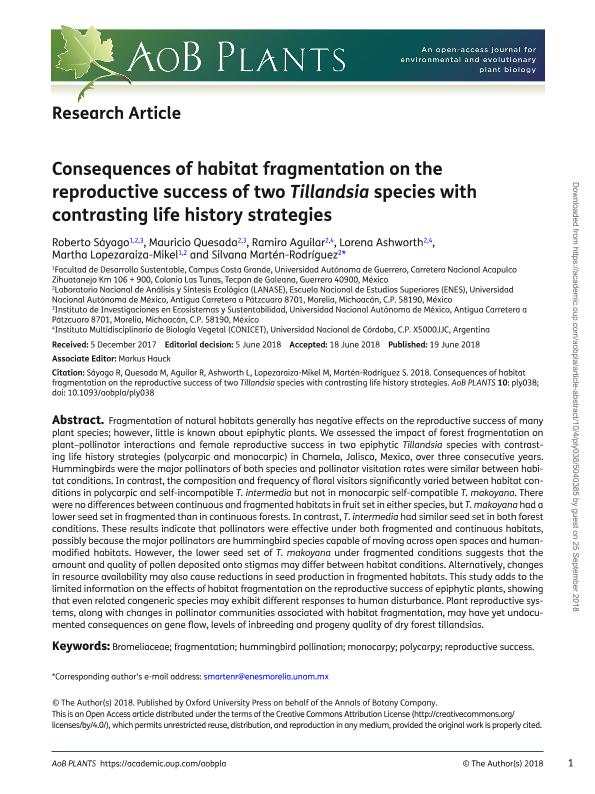Artículo
Consequences of habitat fragmentation on the reproductive success of two Tillandsia species with contrasting life history strategies
Sáyago, Roberto; Quesada, Mauricio; Aguilar, Ramiro; Ashworth, Lorena ; Lopezaraiza-Mikel, Martha; Martén-Rodríguez, Silvana
; Lopezaraiza-Mikel, Martha; Martén-Rodríguez, Silvana
 ; Lopezaraiza-Mikel, Martha; Martén-Rodríguez, Silvana
; Lopezaraiza-Mikel, Martha; Martén-Rodríguez, Silvana
Fecha de publicación:
08/2018
Editorial:
Oxford Univ Press Inc
Revista:
AoB Plants
ISSN:
2041-2851
Idioma:
Inglés
Tipo de recurso:
Artículo publicado
Clasificación temática:
Resumen
Fragmentation of natural habitats generally has negative effects on the reproductive success of many plant species; however, little is known about epiphytic plants. We assessed the impact of forest fragmentation on plant pollinator interactions and female reproductive success in two epiphytic Tillandsia species with contrasting life history strategies (polycarpic and monocarpic) in Chamela, Jalisco, Mexico, over three consecutive years. Hummingbirds were the major pollinators of both species and pollinator visitation rates were similar between habitat conditions. In contrast, the composition and frequency of floral visitors significantly varied between habitat conditions in polycarpic and self-incompatible T. intermedia but not in monocarpic self-compatible T. makoyana. There were no differences between continuous and fragmented habitats in fruit set in either species, but T. makoyana had a lower seed set in fragmented than in continuous forests. In contrast, T. intermedia had similar seed set in both forest conditions. These results indicate that pollinators were effective under both fragmented and continuous habitats, possibly because the major pollinators are hummingbird species capable of moving across open spaces and human-modified habitats. However, the lower seed set of T. makoyana under fragmented conditions suggests that the amount and quality of pollen deposited onto stigmas may differ between habitat conditions. Alternatively, changes in resource availability may also cause reductions in seed production in fragmented habitats. This study adds to the limited information on the effects of habitat fragmentation on the reproductive success of epiphytic plants, showing that even related congeneric species may exhibit different responses to human disturbance. Plant reproductive systems, along with changes in pollinator communities associated with habitat fragmentation, may have yet undocumented consequences on gene flow, levels of inbreeding and progeny quality of dry forest tillandsias.
Archivos asociados
Licencia
Identificadores
Colecciones
Articulos(IMBIV)
Articulos de INST.MULTIDISCIPL.DE BIOLOGIA VEGETAL (P)
Articulos de INST.MULTIDISCIPL.DE BIOLOGIA VEGETAL (P)
Citación
Sáyago, Roberto; Quesada, Mauricio; Aguilar, Ramiro; Ashworth, Lorena; Lopezaraiza-Mikel, Martha; et al.; Consequences of habitat fragmentation on the reproductive success of two Tillandsia species with contrasting life history strategies; Oxford Univ Press Inc; AoB Plants; 10; 4; 8-2018
Compartir
Altmétricas



